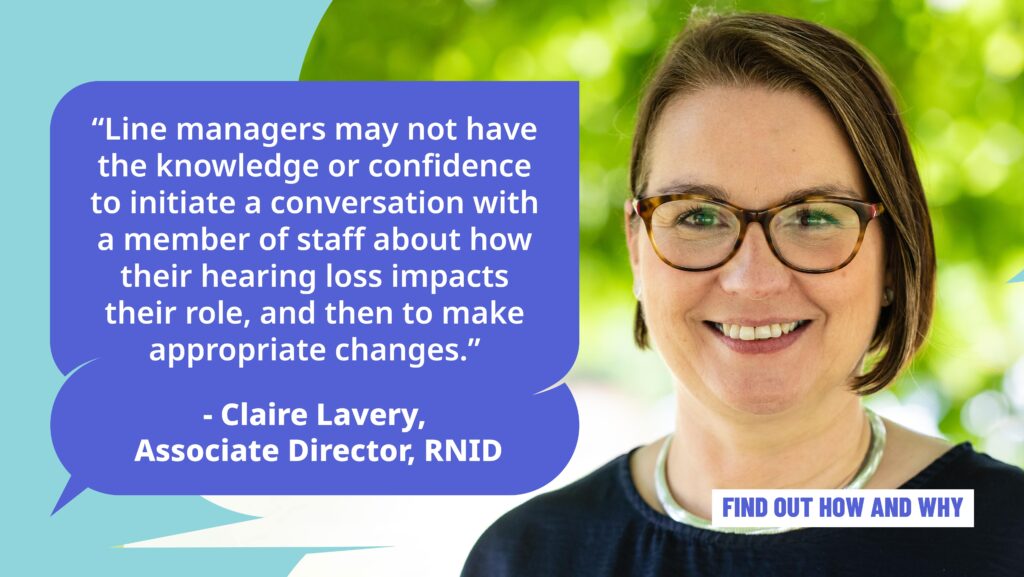
At the beginning of 2023 we launched our new report, which shared insight from employers and recommendations from us about how employers can become more inclusive for staff members who are deaf, have hearing loss or tinnitus.
In our third of a series of deep dives on the report with Claire Lavery, Associate Director for Employment we look at the challenges line managers face when supporting staff with hearing loss.
Line managers are pivotal to delivering cultural aims
Line managers play a pivotal role in connecting staff on the ground to the strategic and cultural aims of an organisation. Best laid plans by Chief Executives and their senior teams can flounder if line managers are not engaged and empowered to deliver these plans through their teams.
This also applies to strategic aims around inclusion and living out cultural values and behaviours to support people who are deaf, have hearing loss or tinnitus at work. Staff, particularly in large organisations, are often very far removed from their senior leaders, and their interpretation of strategy and culture, and how they experience their job, will depend on the behaviours of their direct line manager.
A BCG study in 2019 of 16,500 employees across 14 countries found that in companies where the senior leadership team is committed to diversity but the direct manager is not, only 65% of those surveyed say that they feel free to be their authentic selves at work, compared with 81% in companies where employees see consistent support through all leadership ranks.1
Managing diversity
Line managers have a lot on their plate – charged with achieving KPIs, managing budgets, resolving operational problems, and motivating and managing diverse teams of people.
Senior leaders at our Hearing Loss at Work roundtable events consistently spoke about a sense of being overwhelmed among line managers in being able to navigate increasingly complex diversity and inclusion issues in the workplace.
They cited a lack of confidence as a key problem in addressing hearing loss at work – line managers may not have the knowledge or confidence to initiate a conversation with a member of staff about how their hearing loss impacts their role, and then to make appropriate changes.
Saying the ‘wrong thing’
A common concern of operational managers is that they might ‘say the wrong thing’ and cause offence. Managers will sometimes avoid a subject entirely because of this apprehension around using the ‘wrong’ language.
Over a quarter (27%) of respondents in our 2023 employer report said they did not feel knowledgeable about hearing loss and a third were not confident that they could communicate well with someone with hearing loss. This figure rose to 76% of managers who were not confident about communicating with a BSL user.
Our advice is simple – just ask!
The majority of people who are deaf, or have a hearing loss or tinnitus are happy to be asked about their experience, what terminology they prefer to use, and the impacts they may experience at work. They will often have practical solutions too.
These conversations should start at the earliest opportunity – perhaps even before a new recruit begins their role, or when someone has had a new diagnosis. But it is never too late to begin a conversation – staff are often glad to have an opportunity to share.
Line managers need to be ready to have these conversations and offer support – they need to be equipped with the right levels of knowledge and understanding. RNID’s deaf awareness training offers excellent options for line managers to become better informed on hearing loss.
Simplicity is key
To reduce the sense of overwhelm, and increase confidence among busy line managers, senior leaders have told us that simple, practical information is key. Tools that they can refer to easily and translate quickly into their daily management practice. We are working on developing these tools for managers and our first practical guide is available here: How to effectively manage someone who is deaf or has hearing loss or tinnitus – RNID.
For line managers who have a member of staff with hearing loss in their team, we can offer a bespoke workplace assessment to give you recommendations on adjustments you can make for that individual.
References
Get in touch
If you are a line manager and you would like more support to effectively manage any members of staff with hearing loss, please get in touch with us.